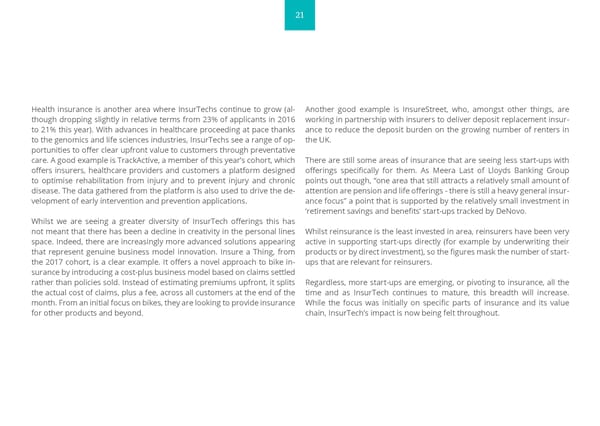21 Health insurance is another area where InsurTechs continue to grow (al- Another good example is InsureStreet, who, amongst other things, are though dropping slightly in relative terms from 23% of applicants in 2016 working in partnership with insurers to deliver deposit replacement insur- to 21% this year). With advances in healthcare proceeding at pace thanks ance to reduce the deposit burden on the growing number of renters in to the genomics and life sciences industries, InsurTechs see a range of op- the UK. portunities to offer clear upfront value to customers through preventative care. A good example is TrackActive, a member of this year’s cohort, which There are still some areas of insurance that are seeing less start-ups with offers insurers, healthcare providers and customers a platform designed offerings specifically for them. As Meera Last of Lloyds Banking Group to optimise rehabilitation from injury and to prevent injury and chronic points out though, “one area that still attracts a relatively small amount of disease. The data gathered from the platform is also used to drive the de- attention are pension and life offerings - there is still a heavy general insur- velopment of early intervention and prevention applications. ance focus” a point that is supported by the relatively small investment in ‘retirement savings and benefits’ start-ups tracked by DeNovo. Whilst we are seeing a greater diversity of InsurTech offerings this has not meant that there has been a decline in creativity in the personal lines Whilst reinsurance is the least invested in area, reinsurers have been very space. Indeed, there are increasingly more advanced solutions appearing active in supporting start-ups directly (for example by underwriting their that represent genuine business model innovation. Insure a Thing, from products or by direct investment), so the figures mask the number of start- the 2017 cohort, is a clear example. It offers a novel approach to bike in- ups that are relevant for reinsurers. surance by introducing a cost-plus business model based on claims settled rather than policies sold. Instead of estimating premiums upfront, it splits Regardless, more start-ups are emerging, or pivoting to insurance, all the the actual cost of claims, plus a fee, across all customers at the end of the time and as InsurTech continues to mature, this breadth will increase. month. From an initial focus on bikes, they are looking to provide insurance While the focus was initially on specific parts of insurance and its value for other products and beyond. chain, InsurTech’s impact is now being felt throughout.
 PwC & Startupbootcamp InsurTech: READY FOR TAKE OFF Page 20 Page 22
PwC & Startupbootcamp InsurTech: READY FOR TAKE OFF Page 20 Page 22